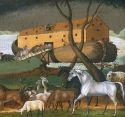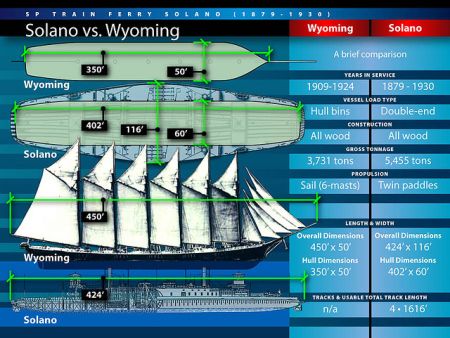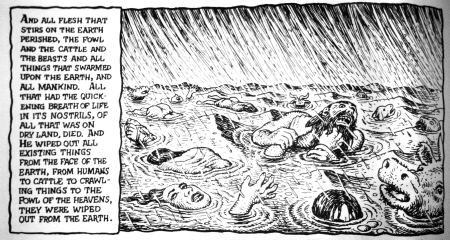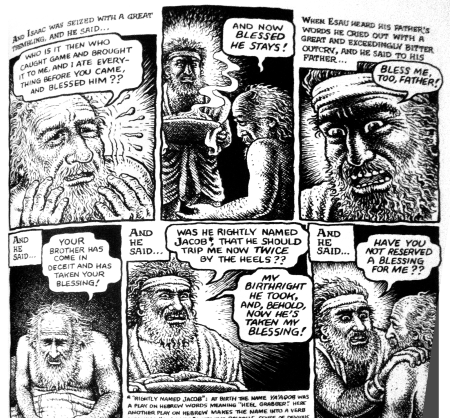This entry is part of a series. For a listing of all entries in the series, go to the Index. Unless otherwise noted, all Bible quotations are from the New Revised Standard Version (NRSV).
 For the most part, chapters 21 through 30 of Numbers weren't much different from previous chapters. They continue on with the narrative of the Israelites wandering the wildnerness, along with more rules and regulations from God. These aren't the most recognizable of stories in the Pentateuch.
For the most part, chapters 21 through 30 of Numbers weren't much different from previous chapters. They continue on with the narrative of the Israelites wandering the wildnerness, along with more rules and regulations from God. These aren't the most recognizable of stories in the Pentateuch.
There is a somewhat weird story included in Chapters 22 through 24. It involves a non-Israelite oracle, Balaam son of Beor, who is able to prophesize for God.
Numbers, Chapter 21
This chapter details a few of the events during the Israelites exile. First, after a Canaanite king captured a few Hebrews, the Israelites asked God for help in enacting their vengeance. "The Lord listened to the voice of Israel, and handed over the Canaanites; and they utterly destroyed them and their towns; so the place was called Hormah [Destruction]."
Next was a story somewhat typical of what's come before. The Israelites started complaining again, and this time God sent serpents to kill them. After the people went to Moses and Moses subsequently went to God, God instructed Moses to make a bronze serpent on a pole. Whenever bitten people looked at it, they were cured. I wonder if this is a relic of an earlier cult? The New Oxford Annotated Bible (NOAB) indicated that it was a holistic cure from the Egyptians.
From there, the Israelites wandered a bit more, camping at various locations, until they came to land of King Sihon of the Amorites, who refused to let them pass through. The Israelites fought and beat Sihon. From there, they continued conquering towns until they controlled the entire land. Apparently not all of these battles were as ruthless as other battles fought in the Bible, as verse 32 indicates that the Amorites were "dispossessed", not annihalated. However, when it came to King Og of Bashan, it was back to slaughtering, "35 So they killed him, his sons, and all his people, until there was no survivor left; and they took possession of his land. " And to be clear, God told the Israelites to slaughter the people of Og.
Numbers, Chapter 22
This chapter begins the story of Balak son of Zippor, king of Moab, and the oracle, Balaam son of Beor. After seeing all the destruction the Israelites had caused in the surrounding lands, Balak was worried about what they would do to his people, and so sent emissaries to Balaam, asking Balaam to curse the Israelites. Balaam responded in what would be his customary method throughout this story. He told the emissaries to wait overnight. God would come to visit Balaam in the night to tell him what to do. On this first attempt, God told Balaam "You shall not go with them; you shall not curse the people, for they are blessed," so Balaam passed on the message.
Balak decided to try again, and sent even more distinguished emissaries with promises of better payment. That night, it seems that the Lord changed his mind, and told Balaam, "If the men have come to summon you, get up and go with them; but do only what I tell you to do." The next morning, Balaam "got up..., saddled his donkey, and went with the officials of Moab." Then, in a break in continuity, even though God had just told Balaam to go, He was still mad that he was doing it, "God's anger was kindled because he was going, and the angel of the Lord took his stand in the road as his adversary." Three times, Balaam's donkey saw the angel, even though it was invisible to Balaam, and tried to turn aside or stop. And each of those times, Balaam struck the donkey to try to make it continue on its way. But the third time, the donkey actually spoke up to Balaam, "What have I done to you, that you have struck me these three times?" Now, the verse said that "the Lord opened the mouth of the donkey", which maybe explains how a donkey could talk. But Balaam's reaction was not at all what you'd expect. If it was me, I'd probably mutter some expletive and wonder how in the hell a donkey began speaking. But Balaam just started having a conversation with it, as if it was completely normal.
At that point, the Lord allowed Balaam to see the angel with his own eyes. After Balaam bowed down to the angel, the angel told him that it was a good thing the donkey kept trying to stall, or the angel would have killed Balaam, for his way was "perverse". But after this brief exchange, the angel gave Balaam practically the same advice he'd gotten the night before, to go with the men, but to only do what God told him to do.
This story so far would be extremely weird if you assume it was all written at one time by one author. God says 'don't go', 'I mean, go', 'I mean, I'm going to try to kill you if you go', 'Oops, I mean, go ahead'. If you assume that this is a blending of two different traditions of the story, then the source of the discontinuities makes sense. But there's still a talking donkey!
Once Balaam finally reached Balak, he warned him that he would only be able to do what the Lord allowed, and then got to work sacrificing animals. He also got his first glimpse of the Israelites.
Numbers, Chapter 23
This chapter was basically just a series of false starts on cursing the Israelites. Balaam would go through all the motions to start the curse, building altars and sacrificing animals, but once he finally heard from God and spoke his oracle, it was only prophesizing the good things that were going to happen to the Israelites.
Numbers, Chapter 24
Balak had Balaam try to curse the Israelites one more time. This time, his oracle included some wording that many people will probably recognize.
a star shall come out of Jacob,
and a sceptre shall rise out of Israel;
it shall crush the borderlands of Moab,
and the territory of all the Shethites.
Some Jews take this as a prophecy of David, while some Christians take it as a messianic prophecy. It's also worth pointing out the translation notes on this passage. An alternative, rather more violent, reading of those last two lines is:
it shall crush the foreheads of Moab,
and the skulls of all the Shethites.
Of course, Balak was furious with Balaam for not actually cursing the Israelites, and told him that he wasn't going to be paid. After a bit more prophesizing from Balaam, they both went their separate ways.
Numbers, Chapter 25
The Lord's anger was once again ignited. The Israelites "began to have sexual relations with the women of Moab," and the Moabite women convinced the Israelite men to worship their gods, especially Baal. With as jealous as Yahweh is, you can guess that the reaction was suitably cruel, "The Lord said to Moses, 'Take all the chiefs of the people, and impale them in the sun before the Lord, in order that the fierce anger of the Lord may turn away from Israel.' "
As soon as Moses had relayed God's message, one of the Israelites brought a Moabite woman back to his tent, in sight of all the congregation. Phinehas was so enraged that he took a spear into their tent and impaled the both of them. Phinehas's actions were apparently just what the Lord wanted, because He ended the plague against the Israelites at that point (but not after killing 24,000 of them). God even explicitly told Moses, "Phinehas son of Eleazar, son of Aaron the priest, has turned back my wrath from the Israelites by manifesting such zeal among them on my behalf that in my jealousy I did not consume the Israelites," and then promised blessings for Phinehas and his descendents.
Numbers, Chapter 26
It was time for another census. This time, there were 601,730 Israelites (excluding the Levites), counting those "from twenty years old and upwards" - just a little less than the 603,550 from the first census in Chapter 2. There were 23,000 Levite males "one month old and upwards". There was a special note at the very end of the chapter that, except for Caleb son of Jephunneh and Joshua son of Nun, no one remained that had left Egypt with Moses, since God had vowed that they would all die in the wilderness.
God gave instructions to the Israelites that once they reached the promised land, they were to divide it up among the tribes proportionally - with the larger tribes receiving more land and the smaller tribes receiving less.
Numbers, Chapter 27
This chapter actually started with a decent rule from God. Three sisters approached Moses because their father had died and they had no brothers, "Why should the name of our father be taken away from his clan because he had no son?" And God said that they should receive an inheritance. And further, whenever any other women are in a similar situation, they should receive their father's inheritance. The instructions continued on through next closest kin in case a man had no descendents at all.
In verse 13, Moses got some pretty bad news, "you also shall be gathered to your people, as your brother Aaron was, because you rebelled against my word in the wilderness of Zin when the congregation quarrelled with me." After all he'd been through, he wasn't going to enter the promised land. But ever the faithful servant, Moses's first concern was finding a replacement who would be able to lead the Israelites in his stead. The Lord chose Joshua son of Nun, and had Moses perform a ceremony in sight of all of the Israelites so that they would know Joshua's authority.
Numbers, Chapter 28
This chapter was more instructions on sacrifices - daily sacrifices, sabbath day offerings, offerings at the start of each month, passover offerings, and the offering for the day of first fruits. And just like offerings throughout these books, these ones included lambs, bulls, rams, grains, flour, wine, oil, etc. And just to be clear, these weren't all simply offerings that were then given to the priests to eat. These were burned on the altar to provide the Lord with his pleasing odour.
Numbers, Chapter 29
This chapter just continued on with the subject of the last chapter - more sacrifices and holy days. The first two were the first day of the seventh month, and the tenth day of the seventh month. On the fifteenth day of the seventh month, a somewhat interesting series began. On that first day, the Israelites were to sacrifice "thirteen young bulls, two rams, fourteen male lambs a year old," all without blemish, of course, along with various non-animal offerings. On the second day, it dropped to twelve bulls, with the rest of the sacrifices staying the same. This continued for seven days until they were down to just seven bulls. Then, on the eighth day, it was only "one bull, one ram, seven male lambs a year old without blemish" along with the various non-animal offerings. So, the countdown is rather interesting. But still, this is a bloody method of worship - 71 bulls slaughtered in 8 days. And God also made it clear that these didn't supercede his normally scheduled sacrifices - they were in addition.
Numbers, Chapter 30
This chapter was all about vows. "When a man makes a vow to the Lord, or swears an oath to bind himself by a pledge, he shall not break his word; he shall do according to all that proceeds out of his mouth." But when a woman makes a vow, it's a bit of a different story. If she's still single and her father overhears her or learns of the vow, he's allowed to disapprove and make it non-binding, "and the Lord will forgive her, because her father had expressed to her his disapproval." Once she's married, it's the same situation with her husband. However, if her male overseers hear of her vow and don't say anything, then she will be bound by it. Widows and divorced women are held to their vows. This is just one more example of inequality for women in the Bible.
---
I don't really have much to write here that I didn't say last week. God acted cruelly towards the Israelites, told the Israelites to enact cruel punishments against each other, and called for the utter destruction of peoples who got in their way. The story of Balaam, though, was a bit of a change from the normal fare I've read so far, especially the talking donkey.
New Revised Standard Version Bible, copyright 1989, Division of Christian Education of the National Council of the Churches of Christ in the United States of America. Used by permission. All rights reserved.

 For the most part, chapters 21 through 30 of Numbers weren't much different from previous chapters. They continue on with the narrative of the Israelites wandering the wildnerness, along with more rules and regulations from God. These aren't the most recognizable of stories in the Pentateuch.
For the most part, chapters 21 through 30 of Numbers weren't much different from previous chapters. They continue on with the narrative of the Israelites wandering the wildnerness, along with more rules and regulations from God. These aren't the most recognizable of stories in the Pentateuch. Over the past few week's I've heard a few conversations of people discussing Noah's Ark like it actually happened. Now, I know that Biblical literalists are out there, and I even knew that some of those people I overheard were of that bent, but it's always a bit jarring to here people seriously discussing something so obviously untrue.
Over the past few week's I've heard a few conversations of people discussing Noah's Ark like it actually happened. Now, I know that Biblical literalists are out there, and I even knew that some of those people I overheard were of that bent, but it's always a bit jarring to here people seriously discussing something so obviously untrue.
 Once gain, I received an e-mail forward that I wanted to respond to. This one had the subject, "To sum up", but looks like a previous incarnation had the title of "Wal-Mart vs. The Morons (NOT A JOKE)". For anyone interested, I've quoted the entire e-mail below the fold.
Once gain, I received an e-mail forward that I wanted to respond to. This one had the subject, "To sum up", but looks like a previous incarnation had the title of "Wal-Mart vs. The Morons (NOT A JOKE)". For anyone interested, I've quoted the entire e-mail below the fold. Depending on where you are in the world, you may call tomorrow something else, like Mardi Gras, Shrove Tuesday, or Pancake Day. But from where I'm from in Pennsylvania, it's called Fastnacht Day (here's a link to the not-so-thorough
Depending on where you are in the world, you may call tomorrow something else, like Mardi Gras, Shrove Tuesday, or Pancake Day. But from where I'm from in Pennsylvania, it's called Fastnacht Day (here's a link to the not-so-thorough 




 The first month of the new year is over, so it's time for me to check the server logs to see how things went on this website. My
The first month of the new year is over, so it's time for me to check the server logs to see how things went on this website. My